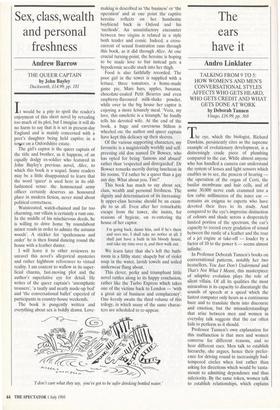Sex, class,wealth
and personal freshness
Andrew Barrow
THE QUEER CAPTAIN by John Bayley Duckworth, £14.99, pp. 181 It would be a pity to spoil the reader's enjoyment of this short novel by revealing too much of its plot, but I imagine it will do no harm to say that it is set in present-day England and is mainly concerned with a peer's daughter being held captive in a tower on a Oxfordshire estate.
The girl's captor is the queer captain of the title and brother, as it happens, of an equally dodgy ex-soldier who featured in John Bayley's previous novel, Alice, to which this book is a sequel. Some readers may be a little disappointed to learn that the word 'queer' is used here in its old- fashioned sense: the homosexual army officer certainly deserves an honoured place in modern fiction, never mind about political correctness.
Waistcoated, watch-chained and far too charming, our villain is certainly a rum one. In the middle of his mischievous deeds, he is willing to drive home 'by roundabout minor roads in order to admire the autumn woods'. A stickler for 'spotlessness and order' he is then found dancing round the house with a feather duster.
I will leave it to other reviewers to unravel this novel's allegorical mysteries and rather highbrow references to virtual reality. I am content to wallow in its super- ficial charms, fast-moving plot and the author's superlative eye for detail. He writes of the queer captain's 'unemphatic trousers', 'a tautly and neatly made-up bed' and 'the conversational ballet' expected of participants in country-house weekends.
The book is pungently written and everything about sex is boldly drawn. Love- making is described as 'the business' or 'the operation' and at one point the captive heroine reflects on her handsome boyfriend back in Oxford and his `methods'. An unsatisfactory encounter between two virgins is related in a style both tender and comic. Indeed, a cross- current of sexual frustration runs through this book, as it did through Alice. At one crucial turning-point, the heroine is hoping to be made love to but instead gets a hypodermic needle stuck into her thigh.
Food is also faithfully recorded. The poor girl in the tower is supplied with a lettuce, three tomatoes, a home-made game pie, Mars bars, apples, bananas, chocolate-coated Petit Beurres and even raspberry-flavoured milk-shake powder, while over in the big house her captor is enjoying a more leisurely meal. 'Vera, my love, this omelette is a triumph,' he fondly tells his devoted wife. At the end of the book, a huge and cavernous Stilton is wheeled on: the author and queer captain have kept this delicacy up their sleeves.
Of the various supporting characters, my favourite is a magisterially worldly and self- preening old don named Dr Bowser, who has opted for being 'famous and absurd' rather than 'respected and disregarded'. Dr Bowser remarks merrily during luncheon in his rooms, 'I'd rather be a queer than a gay any day. What about you, Tim?'
This book has much to say about sex, class, wealth and personal freshness. The dignity and determination of its increasing- ly upper-class heroine should be an exam- ple to us all. Even after her remarkable escape from the tower, she insists, for reasons of hygiene, on re-entering the house of her captor.
I'm going back, damn him, and if he's there and sees me, I shall take no notice at all. I shall just have a bath in his bloody house, and take my time over it, and then walk out.
We learn later that she's left the bath- room in a filthy state: shapely bar of violet soap in the water, lavish towels and soiled underwear flung about.
This clever, perky and triumphant little novel rattles along to its happy conclusion, rather like the Turbo Express which takes one of the victims back to London — 'with a great air of business and complacency'. One keenly awaits the third volume of this trilogy, in which many of the same charac- ters are scheduled to re-appear.
'1 don't care what they say, you've got to be safer drinking bottled water '


































































 Previous page
Previous page